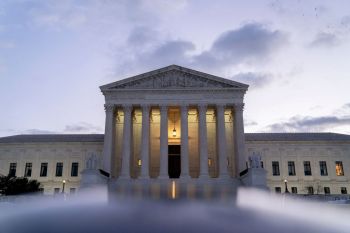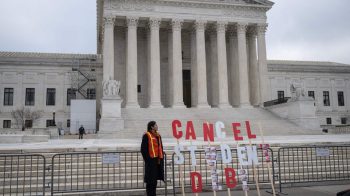
Momentum builds for Biden to cancel student loan debt

Student loan debt increased in the third quarter of 2020 by $9 billion, according to the Federal Reserve Bank of New York. That brings the total to around $1.7 trillion.
There are calls for the incoming Biden administration to cancel at least some of that debt.
Marketplace senior economics contributor Chris Farrell joined “Marketplace Morning Report” host Sabri Ben-Achour to discuss this. The following is an edited transcript of their conversation.
Sabri Ben-Achour: So President-elect Biden hasn’t made any commitments around this, but you’re thinking there’s momentum that’s building for something on student loans. Why do you think that?
Chris Farrell: Well, yes, I do think the question ha become not “if,” but “when” and “how much.” And among those factors, too many college graduates find themselves with unmanageable debts. And college graduates have dealt with two major economic upheavals in, what, a dozen years. We had the great recession, and the pandemic recession. So this job and income payoff from college, it’s been delayed for so many. And it’s another burden to the typical financial pressures that come from launching a career.
Ben-Achour: Right, sort of like the old bargain between the cost of college and what you get from it breaking down. How much debt would be forgiven?
Farrell: You know, here’s the thing: There’s a lot of value judgments that come into play. For example, should debt forgiveness be about all student loans? Or do you focus solely on undergraduate debt? Because the really big borrowing numbers, that mostly comes from graduate school. But those numbers also reflect many professional degrees and they can pay off in higher salaries.
And the Urban Institute did this deep dive into education debt, and it’s disproportionately concentrated among the well-off. But there’s not an insignificant number of lower-income borrowers, and education debt is causing them real financial strain. Which is why, when you look through all the literature, all the commentaries, all the discussion, the number that everyone seems to be coalescing around is [$10,000].
Ben-Achour: Why that number?
Farrell: So that number would capture a lot of people who went to college, but they never finished college, but they have student loans that they can’t discharge. And people who might have sort of a tail end of debt that they haven’t been able to get rid of. So there is just a sense that it does what you want to do with student loans, help out a lot of people, help out as many as possible, but you’re not going to really help out those who are better off — those who have been able to borrow $50,000, $60,000, $70,000, $80,000. You know, $10,000 will help, but you’re going to go more for your lower-income student.
There’s a lot happening in the world. Through it all, Marketplace is here for you.
You rely on Marketplace to break down the world’s events and tell you how it affects you in a fact-based, approachable way. We rely on your financial support to keep making that possible.
Your donation today powers the independent journalism that you rely on. For just $5/month, you can help sustain Marketplace so we can keep reporting on the things that matter to you.

















